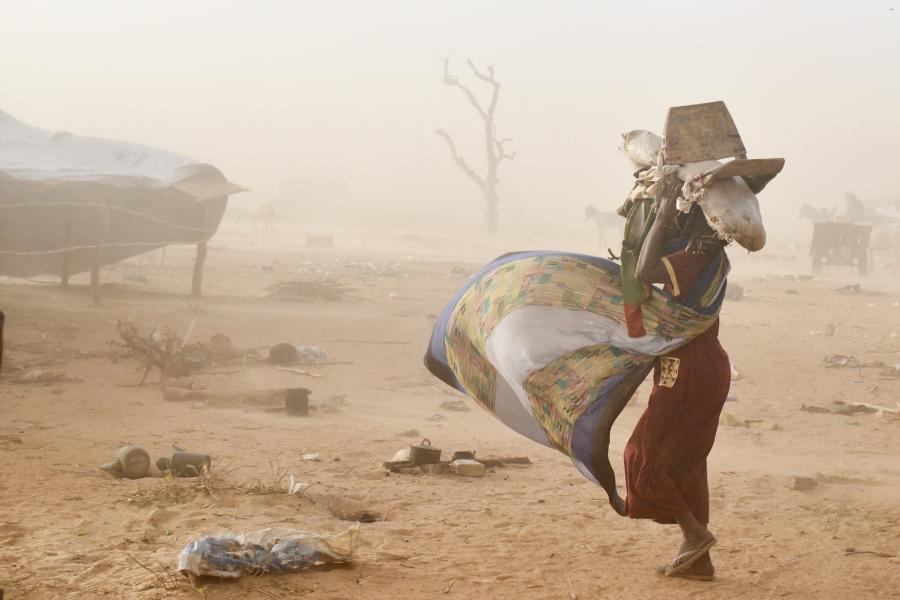2022 Year-end population figures
-
Refugees and asylum-seekers: 762,700, 53% women and 47% men (refugees) and 79% women and children (asylum-seekers)
-
IDPs: 515,700
-
IDP returnees: 404,600
-
Refugee returnees: 5,700
2022 situation overview
For more than 10 years, conflict and insecurity inside the Central African Republic (CAR) have caused significant forced displacement within the country and across borders.
As of December 2022, 515,700 Central Africans were displaced within their own country and 762,700 had sought refuge abroad, including in neighbouring Cameroon (352,700), the Democratic Republic of the Congo (211,200), Chad (126,900), the Republic of the Congo (29,600), Sudan (24,400), and South Sudan (2,300).
Being landlocked, the Central African Republic relies heavily on supply lines through bordering countries and was greatly impacted by the supply chain disruption caused by the Ukraine crisis. Since June 2022, an acute fuel crisis caused a 40% increase in gasoline and oil prices. All these factors worsened the already difficult living conditions of the forcibly displaced people and their host communities, further exposing them to heightened protection risks such as gender-based violence, negative coping mechanisms and child labour. Additionally, rising transport costs and the need to ration fuel reduced access to people in need and hampered the humanitarian response.
While conditions in the Central African Republic as a whole were not yet conducive to safe returns, improvements in specific areas allowed for the possibility of returns. UNHCR focused on conducting protection monitoring and providing accurate information about areas of return for refugees to make a free and informed decision to repatriate to areas of origin. In 2022, 5,600 refugees were able to return to the CAR with the support of UNHCR, bringing the total since 2017 to 32,700. UNHCR distributed over $771,000 in cash assistance to support the returnees upon arrival in the CAR. An estimated 404,600 internally displaced people (IDPs) were also able to return to their places of origin in 2022.
In April 2022, UNHCR and the Government of Cameroon co-hosted a three-day regional ministerial conference, during which the Central African Republic and the six neighbouring countries hosting Central African refugees adopted the Yaoundé Declaration, reaffirming their commitment to pursue a regional approach to deliver solutions for Central African refugees, IDPs, and returnees. The Yaoundé Declaration mandates UNHCR to establish a dedicated regional cooperation mechanism to mobilize political, technical and financial support from all relevant local, regional and global stakeholders towards a comprehensive response to the Central African Republic displacement crisis. The envisaged solutions plan will combine humanitarian assistance with longer-term development interventions towards socioeconomic inclusion to build resilience and self-reliance and to foster a conducive environment for sustainable return and reintegration.
In 2022, UNHCR continued its protection-centred work to meet the increasing needs of displaced Central Africans still awaiting durable solutions. In neighbouring countries, prioritized activities included access to documentation, livelihood support and socioeconomic inclusion for refugees. More than 75% of Central African refugees were hosted in Cameroon and the DRC, where refugees were granted equal access to employment and social services. In Cameroon, the response focused on improving access to documentation to ensure Central African refugees could exercise these rights. In Chad, the work focused on livelihood and empowerment activities, and in Sudan, progress towards local integration was supported by activities to ensure access to documentation and naturalization, as well as livelihood activities.
In the Central African Republic, concerning the gender-based violence response, by the end of 2022, UNHCR supported the establishment of 27 listening centres across 12 prefectures. In 2022 – as part of the Ma Mbi Si project for gender-based violence prevention and response which was launched in 2021 – 2,400 in-person gender-based violence incident reports and 1,735 calls were received. Of the reported gender-based violence incidents, 100% received psychosocial support.
Shelter needs continued to be high and beset by underfunding, and approximately 34,000 IDPs (6,700 households) were provided with emergency shelter kits. Moreover, around 25,000 individuals – including IDPs, refugees and host communities – and 19,600 returnees (4,600 households) received core relief items including tarpaulins, blankets, mats, kitchen sets, buckets, jerry cans and solar lamps. In addition, 14,149 people – including returnees and forcibly displaced persons with specific needs – were provided with cash assistance, bringing the total cash disbursed to $1,105,000, to cover immediate needs such as food and education costs.
